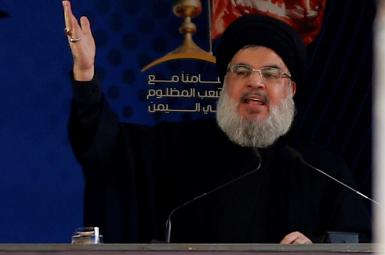
Fuel Bound For Lebanon 'Bought By Lebanese Merchants' - Iran Source
Nour News − a well-placed website close to Ali Shamkhani, Secretary of Iran’s Supreme National Security Council − said Thursday that a fuel shipment “bought by a group of Lebanese Shiite merchants” had left for Lebanon.
Earlier in the day, Hassan Nasrallah, leader of Hezbollah, said Iran was sending a tanker to alleviate the serious energy shortage in Lebanon, which has left homes, hospitals and businesses unable to power electricity generators.
Neither Iran nor Lebanon, which is deep in political and economic crisis, have commented. It was unclear whether the shipment was crude oil, which would need refining, or a fuel like diesel.
"[The shipment] will be considered as their [the Lebanese] property from the moment it is loaded," Nour News said. It described the dispatch of the fuel as “strong action taken by Iran and Hezbollah to break the economic siege of the Lebanese people by a western-Arab-Israeli axis."
Central Bank governor Riad Salameh said last week that Lebanon lacked sufficient foreign reserves to release dollars to buy imported fuel at anything other than the severely depleted exchange rate, which has seen the Lebanese pound lose 90 percent of its value in under two years. With a moribund loss-making government-owned electricity supplier, hospitals, business and homes rely on small generators run on imported diesel.
Social media poster circulating on August 19 depicting an Iranian tanker busting US sanctions.

Vessel ‘Lebanese Territory’
Importing fuel from Iran would run the risk of punitive US action under the current sanctions regime, which target third parties who buy Iranian oil or interact with Iran’s financial sector. There have also been Israeli attacks on shipments of Iranian fuel to Syria, while Iran and Israel have made several allegations over attacks on one another’s shipping. If Hezbollah profits from the fuel sent by Iran, it could also involve anti-terrorism sanctions.
Speaking at a televised Shiite Ashura mourning ceremonies Thursday, Nasrallah warned Israel and the US not to intercept the tanker, which would sail towards Lebanon "within hours..bringing fuel" for hospitals, homes and other essential uses. He said the vessel should be “considered Lebanese territory” from the moment it left Iran.
Danny Citrinowicz, research fellow at Israel's Abba Eban Institute, said in a tweet(link is external) said Nasrallah was thereby bringing the tanker into the "deterrence equation" between Israel and Hezbollah, implying Hezbollah would retaliate if Israel attacked the ship.

Nasrallah did not specify how much oil was being delivered or where it would dock in Lebanon, but said other shipments would follow. Lebanese energy expert Laury Haytayan told the Times of Israel that it was possible “these tankers will go to Syria and shipments will be refined there,” suggesting she thought the shipments were crude oil rather than fuel.
‘Not that easy’
The risks, said Haytayan, were clear: “…this is all prohibited by [US] sanctions, it’s not that easy, and since Hezbollah is doing it in public, there is a lot of danger on Lebanon, we are in danger of being sanctioned, or being attacked.”
In a series of tweets Thursday Saad Hariri, Saudi-allied leader of the Sunni Mustaqbal party who left office as prime minister after the 2019 ‘al-thawra’ protests, claimed Iran was impeding the formation of a government in Lebanon and warned Nasrallah’s remarks could be “dangerous.”
“Is what we heard this morning about the arrival of Iranian ships good news for the Lebanese or a dangerous announcement that Lebanon will become involved in and around internal and external conflicts?" Hariri asked in one tweet(link is external), suggesting in another tweet(link is external) that no Lebanese government would want to defy US sanctions on Iran.
Faced with escalating shortages of basic items such as food, fuel and medication, Nasrallah said early June Iran could help Lebanon if a "courageous" decision was taken. "We, Hezbollah, can go to Iran and negotiate with the Iranian government and buy shipments of fuel," he suggested, with problems over dollar reserves at the Central Bank avoided by paying in Lebanese pounds. It was unclear what currency the payment for the current shipment was in or if any payment was made to Iran.







